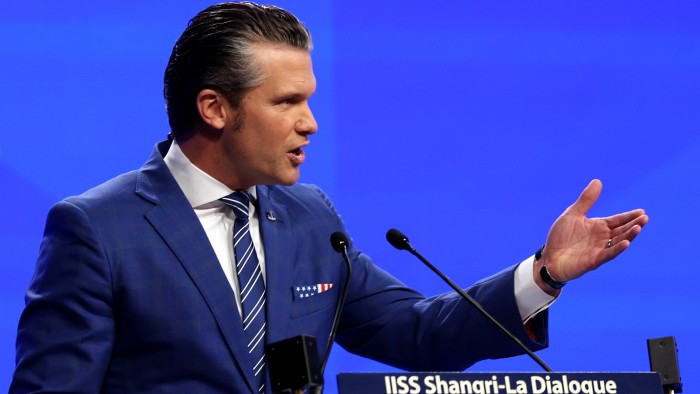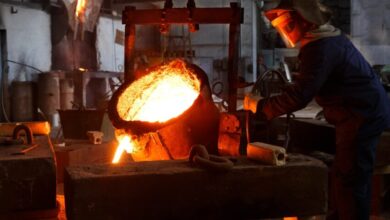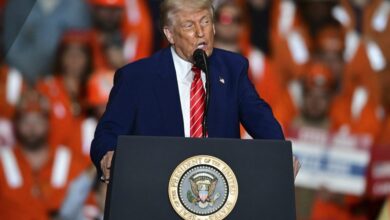Pete Hegseth says Chinese military action against Taiwan ‘could be imminent’

Unlock the White House Watch newsletter for free
Your guide to what Trump’s second term means for Washington, business and the world
US defence secretary Pete Hegseth warned that a Chinese military attack on Taiwan “could be imminent” as he called on America’s allies in the Indo-Pacific to boost defence spending as a further deterrence to Beijing.
Speaking at the IISS Shangri-La Dialogue defence forum in Singapore on Saturday, Hegseth said China wanted to become a hegemonic power in Asia and was acting in a manner that should be an urgent “wake-up call”.
“Any attempt by Communist China to conquer Taiwan would result in devastating consequences for the Indo-Pacific and the world,” he said in his first big speech as defence secretary.
“There is no reason to sugarcoat it. The threat China poses is real, and it could be imminent. We hope not, but it certainly could be.”
US intelligence officials and military officers have said President Xi Jinping has told the Chinese military to develop the capability to invade Taiwan by 2027. But while they are increasingly worried about China’s rapid military rise, most officials stressed an attack was not imminent.
In his second trip to Asia as defence secretary, Hegseth said US partners in the region should follow the “newfound example” of Europe in pledging to boost defence spending, saying “time is of the essence”.
“It doesn’t make sense for countries in Europe to do that while key allies in Asia spend less on defence in the face of an even more formidable threat [from China], not to mention North Korea.”
Hegseth said Washington’s network of allies in the Indo-Pacific, while a US strategic advantage, needed to invest more and quickly upgrade their own defences.
He added that no one should doubt the US commitment to its allies in the region, and that President Donald Trump was committed to “achieving peace through strength”, which would start with deterring aggression in the Indo-Pacific, the US’s “priority theatre”.
While he accused Joe Biden of weakening America, many of the Asia-focused military initiatives he described appeared to be a continuation of policies introduced by the former president.
Hegseth said the US did “not seek conflict” with China but would “not let our allies and partners be subordinated”. He noted that China was using its cyber capabilities to attack critical infrastructure in the US and beyond and was harassing its neighbours, including Taiwan, in the South China Sea.
“Xi has ordered his military to be ready to invade Taiwan by 2027,” he added. “The [People’s Liberation Army] is building the military needed to do it, training for it every day and rehearsing for the real deal.”
Facing the threat from China, Hegseth said many countries were “tempted by the idea of seeking both economic co-operation with China and defence co-operation with the United States”. But he warned that economic dependence on China “complicates our decision space during times of tension or conflict”.
Speaking later on Saturday, Malaysian prime minister Anwar Ibrahim said his country’s approach to dealing with the diverging superpowers was of “active non-alignment” by trying to keep good relations with both sides.
“While we welcome a strong and enduring United States presence in the region towards fostering peace, we also value our vibrant and firm ties with China and our robust partnership across Asia, Europe and the global south,” he said.
The pair were speaking the day after President Emmanuel Macron at the forum called for a “coalition of action” between countries in Asia and Europe amid rising US-China competition.
When asked by the audience of security experts what role European militaries should play in the Indo-Pacific, Hegseth said a “big one” before adding that Washington would prefer they focus their efforts on the Euro-Atlantic region.
Hegseth said there was “something to be said for the fact that China . . . does not appreciate the presence of other countries [in the region] on occasion”, and it could be “useful” if Beijing factored the presence of European militaries in the region in its calculus.
But he stressed: “We would much prefer that the overwhelming balance of European investment be on that continent.”
Elbridge Colby, the Pentagon’s number-three official, has urged European countries to reduce their focus on Asia in favour of Europe.
Colby has told the UK that its deployment of the Prince of Wales aircraft carrier group to the Indo-Pacific was an example of something the US did not believe added much value in the region.
Zack Cooper, an Asia defence expert attending the forum, said Hegseth “hedged” his response on the European role in Asia.
“He seemed to suggest that a European presence in Asia could be helpful for deterrence of China, but also made clear that Europe should still prioritise operations in its own region,” said Cooper of the American Enterprise Institute think-tank. “There is a contrast there with Macron’s insistence last night that France is an Indo-Pacific power.”
Unlike in recent years, China did not send its defence minister to the forum. Underscoring the US commitment to the Indo-Pacific in his speech, Hegseth said: “We are here this morning and somebody else isn’t,” in a reference to the absence of Admiral Dong Jun, China’s defence minister.






